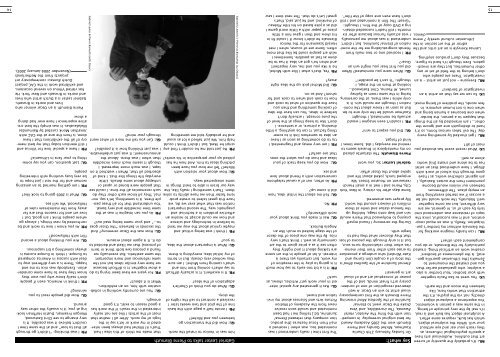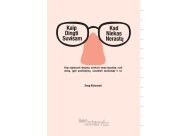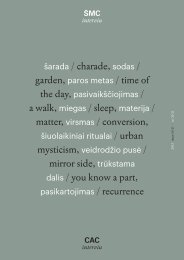interviu 2005 1 1 - Šiuolaikinio meno centras
interviu 2005 1 1 - Šiuolaikinio meno centras
interviu 2005 1 1 - Šiuolaikinio meno centras
You also want an ePaper? Increase the reach of your titles
YUMPU automatically turns print PDFs into web optimized ePapers that Google loves.
15 14<br />
Pierre Bismuth is an Oscar winner who<br />
lives and works in Brussels.<br />
Gabriel Lester is a Dutch artist who lives<br />
and works in Brussels and New York. He<br />
has visited Vilnius on several occasions,<br />
and exhibited work in the CAC project<br />
Dutch Bureau: contemporary art<br />
projects from the Netherlands<br />
(November 2004-January <strong>2005</strong>).<br />
PB: I have a special love for Vilnius and<br />
I still mention today that my best memory<br />
of all the exhibitions that I have<br />
done, is from the one at the CAC with<br />
Jonathan Monk curated by Raimundas<br />
Malašauskas. It was simply the best creative<br />
experience I have ever had doing<br />
a show.<br />
GL: Last question, can you say something<br />
to your fans in Lithuania?<br />
PB: I am getting married to an amazing<br />
woman and for the rest I just hope to<br />
be very busy working with interesting<br />
people.<br />
GL: What is <strong>2005</strong> going to look like?<br />
PB: As you know I love to work and be<br />
confronted by new things, I always go<br />
where people think I am good, but I<br />
love art and for reasons that are far<br />
away from the mainstream rules of<br />
Hollywood. We will see.<br />
GL: Are you thinking about a second<br />
flirt with Hollywood?<br />
PB: I think in America, even if people<br />
don’t really know why you won they<br />
know they have to have some consideration.<br />
Everybody was nice to me and<br />
happy. There is a very different way to<br />
deal with success in America compared<br />
to Europe. I think in Europe success is<br />
always something a bit suspicious.<br />
GL: How did people react to you<br />
winning?<br />
PB: I was thinking: “I didn’t go through<br />
all that to lose” and at the same time I<br />
couldn’t believe it was possible. It is<br />
very strange to see Clint Eastwood,<br />
Morgan Freeman, Dustin Hoffman looking<br />
at you; it is usually the other way<br />
around.<br />
Gabriel Lester & Pierre Bismuth (with Oscar)<br />
GL: Can you tell me more of what went<br />
through your mind?<br />
PB: As you can imagine it was at the<br />
same time incredible and very banal.<br />
You understand that for all these people<br />
there, it is something, let’s say, normal.<br />
They all know each other they do<br />
such ceremonies all the time. I could see<br />
that people were bored or upset or<br />
unhappy about some details. Little<br />
everyday life things like that. I kind of<br />
absorbed all that. When I watched it on<br />
tape, I was much more impressed. I<br />
though it seems much more incredible<br />
than when I was there. About the<br />
announcement: it was just unbelievable.<br />
I was just thinking how is it possible?<br />
GL: How was the Oscar ceremony? And<br />
the seconds in between “the Oscar goes<br />
to...” and your name being read out?<br />
PB: For years we have been trying to do<br />
a show together. It is difficult because<br />
we have very similar ideas but not the<br />
same references and more important<br />
the same aesthetic. But eventually we<br />
found a process (we both think in term<br />
of process) that we liked and decided to<br />
do it. It is again about erasure.<br />
GL: You are currently working in collaboration<br />
with him, on an exhibition.<br />
What is it about?<br />
that made me think of this idea I had.<br />
That’s it! Michel had always been interested<br />
in my work or let’s say in the<br />
logic of my work. After all I realise that<br />
most of the artists I like are not really<br />
interested in the result. If the work has<br />
a good reason to exist, it’s good<br />
enough.<br />
PB: He just told me he couldn’t find any<br />
script he liked, but I didn’t think I could<br />
help him. We just talked a lot as usual<br />
and he probably told me something<br />
GL: How about your relation with<br />
Michel? Tell me how you have been<br />
pitching ideas to him. And how he has<br />
picked up your perspective in his works?<br />
PB: I think I was being critical and<br />
maybe cynical about the way we tend<br />
to believe in technology and science<br />
and how we could accept to resolve an<br />
affective problem in a technical and<br />
pragmatic way. The second important<br />
notion was that what ever we do, we<br />
have this great talent to create problems<br />
faster than we have ability to solve<br />
them. That’s something I really like, the<br />
way our brain is able to twist things in<br />
some unexpected ways.<br />
GL: What is important about the idea,<br />
to you?<br />
PB: It is excellent. It is actually difficult<br />
to say what’s coming from him and<br />
what’s coming from Michel. I am sure<br />
they worked very closely. But in terms<br />
of my initial idea, everything is there.<br />
GL: What do you think of Charlie’s<br />
adaptation of the idea?<br />
PB: I wrote half a page with the basic<br />
line of the plot and two weeks later I<br />
received a contract to sell the rights of<br />
the story.<br />
GL: How did the transaction go<br />
between you and Michel?<br />
him was in Venice to install the work.<br />
PB: Yes, that’s what I like with Michel,<br />
he is like you and me, very impatient<br />
and when he’s got an idea it has to be<br />
done as fast as possible. Sometimes I<br />
wish art people could be like that more<br />
often. Some are of course, when I met<br />
Harald Szeemann for the Venice<br />
Biennale he didn’t know if I could fit in<br />
his show and then I gave him a little<br />
piece of paper with a little word game I<br />
did as a joke based on his title Plateau<br />
of mankind, and he just said, that’s<br />
great! Let’s do that. The next time I saw<br />
GL: Did Michel pick up the idea right<br />
away?<br />
PB: I am very messy and fragmented; I<br />
try to do something as soon as I have<br />
an idea to somehow link it to something<br />
factual. It can be anything, a little<br />
drawing, a picture, or a sentence. I<br />
don’t like to keep things at the level of<br />
the pure concept. I actually don’t<br />
believe in ideas. You can have the idea<br />
of cooking something and then you<br />
have the question of what to cook and<br />
how to cook and when to cook and for<br />
whom? And so on.<br />
GL: How do you keep track of your<br />
ideas and how do you select the ones<br />
that are useful?<br />
PB: As often, out of a casual telephone<br />
conversation with a friend about love<br />
and sex.<br />
GL: Tell me about the initial idea, how<br />
did it come up?<br />
PB: No.<br />
GL: Has it made you think about your<br />
work differently?<br />
PB: It is a bit too early to say how much<br />
it is going to play in the reception of<br />
my work, but certainly yes there is<br />
interest. A lot of people in the art scene<br />
are talking about it and rightly they<br />
often see it as a prize given to the art<br />
community as well. I think that’s very<br />
nice. By the way one piece of the decor<br />
of the stage looked so much like an<br />
Angela Bullock.<br />
GL: Has it generated any special interest<br />
in your work yet? Articles, shows, as<br />
such?<br />
The first time I really understood I was<br />
nominated too, was when I received a<br />
mail from Focus Features [the production<br />
company that released Eternal<br />
Sunshine, Ed.] telling me I had been<br />
nominated and would soon receive<br />
news from the Academy of Motion<br />
Picture Arts and Sciences about my invitation<br />
and travel.<br />
Gabrielis Lesteris ir Pierre’as Bismuthas (su Oskaru) Gabriel Lester talks to Pierre Bismuth<br />
PB: I received one or two mails from<br />
friends congratulating me for the nomination<br />
of Eternal Sunshine, but I didn’t<br />
understand it was about me personally.<br />
I was actually furious because after six<br />
months I still hadn’t succeeded obtaining<br />
a DVD copy of the film. I thought:<br />
“Great! The film is nominated and I still<br />
don’t have even one copy of the film”.<br />
GL: When were you nominated? When<br />
did you first hear you might win an<br />
Oscar?<br />
PB: I couldn’t even imagine I would<br />
actually be nominated, I thought<br />
Kaufman would be the only one to be.<br />
But as soon as I knew about the nomination<br />
I thought we would win. It is<br />
only while I was there, at the ceremony,<br />
being in the same room as Sydney<br />
Lumet, Al Pacino, Clint Eastwood…<br />
looking at them on the stage, I<br />
thought: “It can’t be possible!”<br />
GL: Did you expect to win?<br />
Pierre Bismuth: The statuette placed<br />
on my mantelpiece in Brussels seems to<br />
remind me everyday I did. Some times I<br />
kind of forget.<br />
Gabriel Lester: So, you won!<br />
Some days after his victory, in New York<br />
City, Pierre and I met in a small French<br />
restaurant on Houston Street. We<br />
enjoyed lunch, joked about life and<br />
spoke about the Oscar affair.<br />
During the ceremony I found myself<br />
praying to Hollywood that Pierre would<br />
win and leap onto stage, holding up<br />
the famous statue and smile at those<br />
millions of viewers around the world.<br />
My prayer was answered.<br />
Eternal Sunshine of the Spotless Mind is<br />
the story of a couple (Jim Carrey and<br />
Kate Winslet) who undergo a procedure<br />
to erase each other from their memories<br />
when their relationship turns sour,<br />
but it is only through the process of loss<br />
that they discover what they had to<br />
begin with.<br />
On Sunday February 27th Charlie<br />
Kaufman, Michel Gondry and Pierre<br />
Bismuth won the <strong>2005</strong> Academy Award<br />
for best original screenplay. In competition<br />
with the films The Aviator, Hotel<br />
Rwanda, The Incredibles, and Vera<br />
Drake the Oscar went to Eternal<br />
Sunshine of the Spotless Mind crowning<br />
Pierre Bismuth as the first contemporary<br />
visual artist to win an Oscar. A well<br />
deserved recognition of one of contemporary<br />
art’s finest minds, and of the<br />
power of conceptual art and of visual<br />
art in general!<br />
Say what?:<br />
Laimas Kreivytë is an art critic and the<br />
editor of the art section in the<br />
Lithuanian cultural weekly 7 <strong>meno</strong><br />
dienos.<br />
ML: Everyone – not just an artist – is an<br />
investigator. There are people who<br />
don’t belong to the field of art or any<br />
other humanities, but they are investigators.<br />
Even though it’s hard to figure,<br />
because they don’t produce anything.<br />
LK: So can we say that an artist is an<br />
investigator of borders?<br />
ML: I get shocked by something every<br />
day. The evil takes various forms, so it’s<br />
hard to distinguish one and ignore the<br />
other... I am interested by all the things<br />
that happen to a person, the border<br />
when one becomes a human being and<br />
when one is not human anymore. In<br />
few words, the problem of being moral.<br />
LK: What recent event has shocked you<br />
most of all?<br />
ML: I can hardly imagine working for<br />
the Biennale without my brother’s participation.<br />
Really, it was an equal cooperation,<br />
and it was successful, since the<br />
topic of resistance was understood similarly<br />
by each of us. In general, we are<br />
very different, but we come together<br />
well. Naturally, the work would not be<br />
a success if we started everything from<br />
an empty place. The differences<br />
between our visions would become<br />
prominent from the outset. Basically, I<br />
am against collective works, as I have<br />
gone through this school of work with<br />
Blizgë. I have understood that an artist<br />
has to be alone and create [his] works<br />
alone as well.<br />
LK: You went to Sao Paulo together<br />
with your brother. Your brother is also<br />
a sculptor, who graduated earlier than<br />
you and created the monument to<br />
Þemaitis [the Lithuanian guerrilla general].<br />
Is the phenomena of brothers’<br />
creative work an artificial thing, created<br />
particularly for the Biennale, or do you<br />
complement each other?<br />
ML: It’s probably the quantity of screen<br />
art that outshine. Audiovisual arts have<br />
a specific psychological influence, as<br />
they reach your ear and eye without<br />
your will. While the sculptural object,<br />
which has bulk, requires some effort.<br />
A sculptural object has bulk and is real,<br />
it’s real by the very principle of being,<br />
in the same way a person is volumetric.<br />
You experience a sculptural object<br />
directly, not via the psyche, it’s the<br />
attraction that works here, like<br />
between the moon and the earth.





